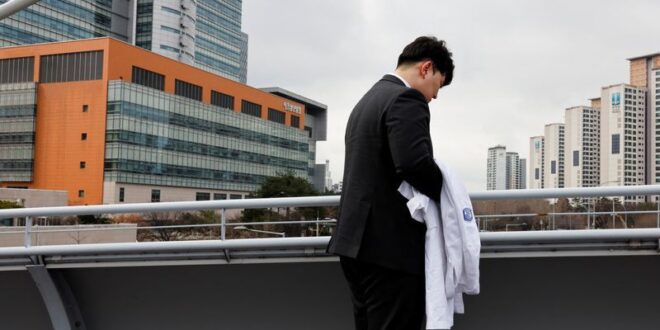SEOUL (Reuters) – Ryu Ok Hada always wanted to help people, but now the South Korean trainee doctor has walked off the job and stands outside the hospital where he worked, holding his medical gown in his hand.
Park Dan, who recently realised his childhood dream of being an emergency physician, is also one of over 7,800 interns and residents who have resigned in a confrontation with the government, which threatens to arrest them.
Ryu and Park say the junior doctors, a crucial cog in South Korea’s highly regarded medical system, are overworked, underpaid and unheard.
Hospitals have turned away patients and cancelled surgeries after about two-thirds of the country’s young doctors walked off the job this month in protest.
The young doctors say their pay and working conditions should be the priority, rather than the government’s plan to boost the number of physicians. The authorities say more staff are needed to increase healthcare services in remote areas and meet the growing demands of one of the world’s most rapidly ageing societies.
“The current medical system in South Korea, which is a great one, is run by making cheap trainee doctors keep grinding,” Ryu, 25, told Reuters.
Senior doctors and private practitioners have not walked out but have held rallies urging the government to scrap its plan, with 400 gathering in Seoul on Sunday.
But the government’s plan to boost medical school admissions is popular, with about 76% of respondents in favour, regardless of political affiliation, a recent Gallup Korea poll found.
TORN BETWEEN PATIENTS, POLICY
Intern and resident doctors in South Korea work 36-hour shifts, compared to shifts of less than 24 hours in the U.S., according to the Korean Intern Resident Association. It says half the young U.S. physicians work 60 hours a week or less, while Korean doctors often work more than 100 hours.
Ryu said he worked more than 100 hours a week at one of the country’s most prestigious university hospitals, for 2 million won to 4 million won ($1,500-$3,000) a month including overtime pay. A first-year U.S. resident averages about $5,000 a month, according to American Medical Association data.
Hospitals have not processed the resignations of the protesting doctors, who say they are not on strike. The government has ordered them back to work, threatening to arrest them or revoke their licenses, saying their collective action cannot be justified and people’s lives must come first.
Park and other doctors say the order is unconstitutional, forcing them to work against their will.
The doctors on walkout represent just a fraction of South Korea’s 100,000 doctors, but they can make up more than 40% of staff at large teaching hospitals, performing crucial tasks in emergency rooms, intensive care units and operating rooms.
Emergency rooms at South Korea’s five biggest hospitals were on “red alert” on Sunday, meaning they were running out of beds. Prime Minister Han Duck-soo said on Friday that public hospitals would stay open longer and on weekends and holidays to meet demand.
Park, 33, who heads the Korean Intern Resident Association, wants the authorities to bring doctors into essential disciplines such as paediatrics and emergency departments at large hospitals.
Doctors want better legal protection from malpractice suits and changes to a system where many hospitals rely on a low-paid workforce and off-insurance services to stay afloat in a country often praised for providing universal quality medical coverage affordably, Park said.
He said he was torn between his patients and a government enforcing policy without listening to the doctors, but that he had little choice.”With pride to save patients I came this far. As many doctors say, it was heartbreaking and difficult to leave patients behind,” Park said. “But the current system is distorted, so we need better than that.”
($1 = 1,329.9500 won)
(Reporting by Ju-min Park and Minwoo Park; Editing by William Mallard)
 BeritaKini.biz Berita Viral Terkini di Malaysia
BeritaKini.biz Berita Viral Terkini di Malaysia





